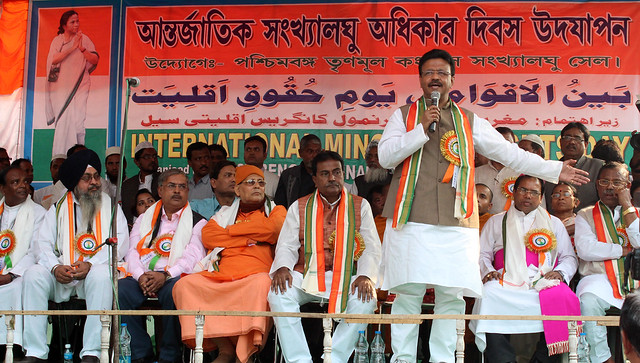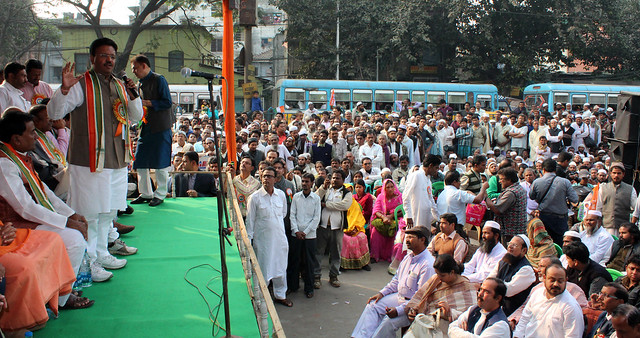By TwoCircles.net Staff Reporter,
New Delhi: An Independent Peoples' Tribunal was jointly organised by Human Rights Law Network, All India Network of NGOs and Individuals working with National / State Human Rights Institutions [AiNNI], Human Rights Alert, Vanvasi Chetna Ashram, Paryavaran Suraksha Samiti, South India Cell for Human Rights Education and Monitoring, Banglar Manabadhikar Suraksha Mancha (MASUM), People's Vigilance Committee on Human Rights, Human Rights Advocacy and Research Foundation and Asian NGO Network on National Human Rights Institutions (ANNI) on the functioning of the National Human Rights Commission (NHRC) on December 14, 15 & 16, 2013 in New Delhi.
This was being organised on the occasion of the 20 years of Paris Principles [1993], 20 years of the Protection of Human Rights Act [1993] and 20 years of the Vienna Conference [1993].
![]()
The jury was chaired by Justice (Retd.) Hosbet Suresh, [Former Judge of the Mumbai High Court] and comprised Justice (Retd.) Surendra Bhargav, [Former Chief Justice of Sikkim High Court], Justice (Retd.) W A Shishak, [Former Chief Justice of Chattisghar High Court ], Justice (Retd.) K Sukumaran, [Former Judge of the Mumbai and Kerala High Court], Mr. Yambem Laba, [Former Member of Manipur SHRC], Prof. Babu Mathews, [Professor, National Law University, New Delhi], Prof. Kamal Chenoy, [Professor, Jawaharlal Nehru University, New Delhi], Prof. Anuradha Chenoy, [Professor, Jawaharlal Nehru University, New Delhi], Prof.Vimal Thorat, [Professor and Social Activist].It's been 20 years since the formation of National Human Rights Commission (NHRC). The NHRC was constituted under the Protection of Human Rights Act, 1993, for the protection and promotion of human rights in India.
The first day comprised of three sessions. The first session was on 'NHRC's compliance to UN standards'; the second session on 'Police encounter, custodial torture, custodial death and the response of the NHRC'; and the third session on 'Killings and torture by armed forces and the response of the NHRC'.
The second day comprised of five sessions. The first session was on 'Attack on human rights defenders and response of NHRC; the second session on 'Communalism and Response of NHRC, the third session was on 'Violation of Women's Rights and Responses of NHRC, the fourth session was on 'Dalit issues and the Response of NHRC'; and the fifth session was on 'Tribal Rights and the Response of NHRC'.
The third day again comprised of four sessions. The first session was on 'Environment, housing and displacement and the response of NHRC; the second session on 'Health rights and response of NHRC; the third session on 'Child rights and the response of NHRC'; and the fourth session 'Disability and the response of NHRC'. We patiently listed in each session to a series of expert testimonies followed by depositions from victims of different violations who had approached the NHRC at different points of time.
Many noted activists, lawyers and intellectuals from various organizations shared their views on the issues concerning the grass root problems in the country.
NAPM and NBA was represented by Ms. Medha Patkar, she talked about the displacement and inadequate rehabilitation of the people displaced because of land acquisition and especially those of displacement. She especially emphasised on the need of NHRC to play a proactive role in the rehabilitation of homeless people. She also talked expanding the role of NHRC towards providing justice to the people looking beyond the current system of justice mechanism.
“The NHRC should engage more with the different ministries and work towards a broader development of Act where issues are mitigated with and through democratic processes,” she said.
Ms. Shivani Chaudhary of HLRN, talked about preparation of a National Plan of Action on Human Rights as per Vienna Principles, which should be put up before the Parliament of India for further action.
Mr. Praful Samantarai spoke about land issues. “In the present regime of the law, the land is grabbed by the mafias, corporates and the government is also exploiting the tribals and farmers forcing them to quit from their own land,” he asserted.
Mr. Simpreet Singh talked about the urban homeless poor. “NHRC has made appointment of core groups on bonded labour, health etc, but nowhere the urban poor or housing is a core group. It is clear that for the NHRC, the urban poor are not a focus area at all,” he said. He also added that the NHRC should recognise "Right to Housing" as a fundamental right.
At a time, when a majority of the Indian population is living in a state of continuous famine and which is getting worst over years, Mr. Binayak Sen talked about the need for proactive role of the NHRC. He said that there should be a right to health and the NHRC should make recommendation to the government regarding that.
At the end of the third day the Jury made the following interim recommendations:
- The PHRA 1993 needs an urgent , immediate, overhauling ,after 20 years of working with the same – the amendments are urgently required in the fields of the definition of human rights, the composition, selection and appointment of the Chair and Members/ Deemed Members, its functions, procedures in complaints handling, powers of the commission, steps after enquiry etc.
- The Government and Parliament needs to know that the NHRC has been granted 'A' grade status at the time of its accreditation before the ICC in May 2011 and made very serious recommendations that need to be strictly adhered to urgently.
- The Paris Principles 1993 and ICC General Observations of May 2013 need to be strictly adhered to in any effort at law making that is made.










